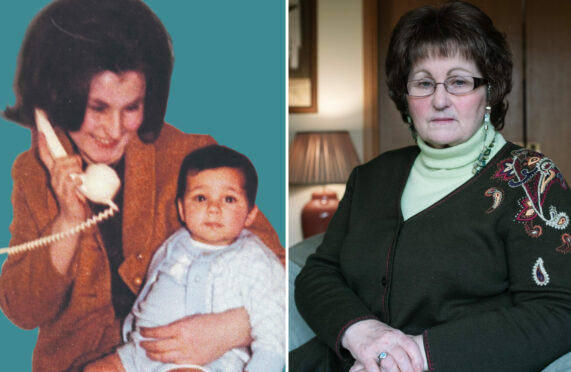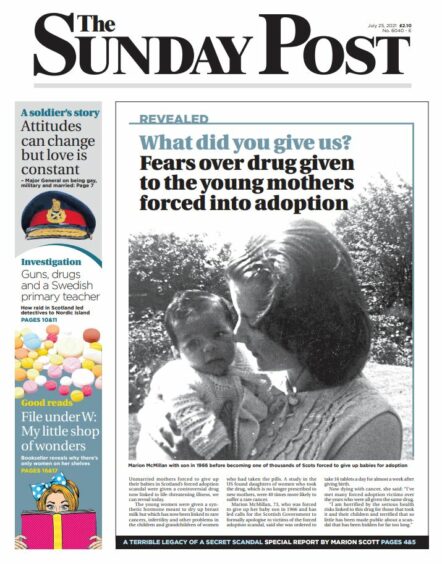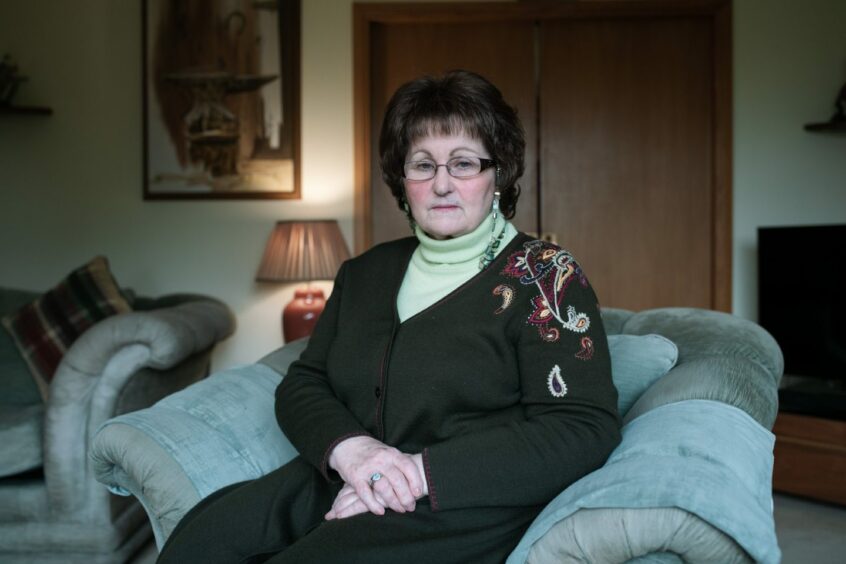
Victims of forced adoption, one of Scotland’s biggest human rights scandals, have called on Nicola Sturgeon to apologise before she stands down as first minister.
Leading campaigner Marion McMillan, 74, who was just 17 when she discovered she was pregnant but had her baby son taken from her, said: “Thousands of young women, women like me, were treated as if we were the dregs of humanity for the ‘sin’ of falling in love outside marriage.
“The far, far bigger sin was what was done to us, and our babies. It is beyond time for that to be acknowledged. It is beyond time for the Scottish Government to apologise for what was done to those young women and their children.”
Last year, on International Women’s Day, Sturgeon apologised for the women killed in Scotland after being accused of witchcraft 500 years ago. One year on, on Wednesday, McMillan is urging the first minister to apologise for the treatment of 60,000 Scots mothers who had their babies taken from them throughout the 1950s, ’60s and ’70s because they were pregnant but unmarried.
In an open letter to the first minister, McMillan concludes: “Tell me this International Women’s Day is not a fitting occasion to offer all those mothers and all their children solace, comfort, compassion and an apology.”
Last week, in response to a report published last summer by Westminster’s Joint Committee on Human Rights (JCHR), the UK Government apologised to the victims of forced adoption, saying: “We are sorry to all those affected by historic adoption practices. We are sorry on behalf of society for what happened.
“Many unmarried women were not given a choice to keep their babies and did not have the support to do so. Society’s attitudes to unmarried mothers at this time led to unmarried mothers feeling shame and a need to keep their experiences secret: many are still feeling the impact of this today.
“This shame was then compounded by the pain of giving away their baby. We are sorry that unmarried women had to endure this shame and secrecy.
“We are sorry for the treatment that unmarried mothers received in mother and baby homes and hospitals. The accounts of women being made to feel that they were being punished for their pregnancy in mother and baby homes are appalling, as are the accounts of mothers being mistreated during labour and childbirth, facing verbal abuse or being denied pain relief.”
JCHR chair Joanna Cherry, an SNP MP, said it was disappointing a government minister had not delivered a formal apology in the House of Commons but added: “We also recognise that in its response the government have clearly and repeatedly acknowledged that what happened to unmarried mothers and their children was profoundly wrong.”
Former JCHR chair Harriet Harman said: “The UK Government, in its response to our report, has said it is sorry for the treatment of unmarried mothers, it has recognised how wrong these adoption practices were and it has said sorry on behalf of society for what happened to these women and children.”
McMillan, who has cancer and has been campaigning for an official apology for years, today details her lifetime of loss and reveals how her baby’s father begged to marry her.
Instead, his family flew him to Pakistan for a hastily arranged marriage while she was banished from her family home in Stranraer. Officials at the mother and baby home where she gave birth referred to her as the “Scots girl with the illegitimate half-caste son”.
She also tells how: she and the other unmarried mothers were made to sit in the “penitent” pews in church; she was threatened with jail if she tried to find her baby; and, after 40 years, she was reunited with her son but the fall-out from the secret pulled her family apart.
She said: “The way forced adoption victims were shamed allowed the scandal to remain a dark secret for decades. We were so vilified; thousands remain too afraid to speak out for fear of being judged today.”
The campaigner, whose evidence helped secure the world’s first forced adoption apology in Australia, fell in love with the nephew of a local businessman when she joined their family firm straight from school.
She said: “I became pregnant. He desperately wanted to marry me, and I desperately wanted to marry him.
“But before we could make plans, he was flown to Pakistan by his family to get married. My parents were angry and sent me to a mother and baby home.”
She was sent to Hopedene, a Salvation Army-run home in Newcastle upon Tyne, and gave birth to a baby boy in May 1966, without any pain relief.
The traumatised teenager was not allowed to hold her newborn son and remembered: “My baby was literally torn from my body and I was left with a horrific gynaecological injury for the rest of my life.
“I was told I should suffer for my sin and my pain would be a reminder never to have sex again until I was married.
“It was the next day before I was allowed to hold my baby for the first time. As I looked into his eyes and let his tiny fingers curl around mine, breathing in the special smell all newborns have, I called him William – my Wills.
“I made him a silent promise that I would love and cherish him, and nothing bad would ever happen to him. It was a promise I wasn’t allowed to keep.”
She was given handfuls of pills to dry up her breast milk so her baby could be put up for adoption as soon as possible and recalled how the tablets were “handed out like sweeties to all the girls in the home.”
Only decades later did she discover she and others had been given Stilbestrol, which is now known to cause cancers and life-changing birth defects in the children and grandchildren of the women fed the man-made oestrogen hormone.
McMillan said: “I was given a shock diagnosis of terminal cancer with just weeks to live four years ago. I’ll die not knowing if the Stilbestrol I was given by the handful caused the cancer that will end my life.
“We have a moral duty to raise awareness about the side-effects of those drugs we were given, and any apology must include a promise to do that.
“There was no compassion. No humanity. When William was three months old, I was told a family wanted to take him. He was returned a few days later. They wanted a perfect baby instead. William was taken from the nursery and placed in a room on his own.
“There were no toys, nothing to comfort him. His cries echoed around the home but I couldn’t go to him.
“Whenever I thought the coast was clear, I’d sneak in and hold him. One night I was caught, hiding under his crib.
“I was ordered to leave the home to a nearby shelter and only allowed in during the daytime to work and clean.”
She described the regime as “brutal” (the Salvation Army has since apologised for how she was treated). Every Sunday, unmarried mothers were ordered to attend church.
She said: “It was a fresh humiliation. Sitting in the penitents’s pews in full view of the congregation as they praised God. We were outcasts on display.”
At nine months old, William’s first Christmas brought news that would change their lives forever. Another family wanted to see him.
McMillan said: “I cried and begged to keep my baby. I was told if I loved my son, I’d give him to a proper family.
“I was ordered to get him dressed for his new family. By the time I came with the clothes I’d carefully knitted for him, his crib was empty and he was gone.
“This was no carefully scripted scene from Call The Midwife. I hadn’t chosen to give my baby up as a lifestyle choice. This was real, a living bereavement which never left me. It would be another 40 years before I saw him again.”
A week later, she was standing on the doorstep of her family home in Stranraer. She was given £30, a suitcase, and told to make her own way in life. “I was told to take the shameful secret of my baby to my grave. As far as my parents were concerned, William did not exist.”
She found lodgings in a women’s shelter in Glasgow and was called to a meeting at the City Chambers and remembered: “A social worker said I had to sign some papers in front of a Justice of the Peace.
“I was shaking as he towered over me and warned I’d be jailed if I ever tried to see my child. Nobody explained I had rights. I did what I was told, like all the other mothers, I signed the document put in front of me.”
Under the law, McMillan should have had access to her own lawyer. She would have been able to claim benefits and housing support to allow her to keep her baby.
She said: “We were sentenced to an endless abyss of trauma, a living bereavement.”
Mum who lost her firstborn to forced adoption begs for a government apology as her dying wish
Within weeks of arriving in Glasgow, she met George, the man who was to become her husband and father to their three children. She said: “I was so filled with shame, almost the first words I said was I wasn’t worthy of him. George put his arms around me and my secret tumbled out. He dried my tears and has never stopped.”
George always understood how what should have been special occasions like Christmas and William’s birthday were difficult for his wife. He said: “We had three wonderful children together and Marion was the best mum you could imagine. But I would catch her eye and knew she was wondering how William was.
“Had he grown tall? Was he clever? Was he loved? We’d taken the decision not to tell our children about William until they were older and could understand, so Marion hid her sorrow.”
She never gave up hope of finding her firstborn. She said: “My biggest fear was him believing I hadn’t wanted him. Everywhere, barriers were put up to prevent me finding William.
“All I could do was pray that his new mother and father loved him. I lost decades searching, unaware he was trying to find me, too.”
She began campaigning to highlight the scandal of forced adoption, attending conferences and lectures around the world, doing her best to support mothers and adoptees struggling to cope in secrecy and shame with what had been done to them.
Just before William’s 40th birthday, her dream came true. They found each other and arranged a reunion at a hotel in the north of England. McMillan said: “We fell into each other’s arms, sobbing.”
But if she hoped for a Hollywood ending to their reunion, this was anything but. She revealed: “The damage caused to both of us wouldn’t just affect us. The trauma of revealing the secret we’d kept from our children would be a Pandora’s Box that left scars which will never heal.
“Without the proper professional help needed to support a family preparing for reunion, we were doomed to struggle with anger and loss.
“I regained a son but my daughter is now estranged from us. My boy is a very clever man but he still finds it difficult not to blame me for what happened.
“I will love him forever, but he will never love me as a son. He loves the mum who brought him up, and he has told me that.
“His reactions are not unique. Forced adoption mothers are the ones who bear the brunt of the anger.
“That is why this apology is important, along with an inquiry into the use of Stilbestrol and the much-needed change in how victims can more easily access records to find each other.
“Scotland has a unique opportunity to drag this dark history out from under the carpet.”
Last week, in response to a question from Labour MSP Monica Lennon, Nicola Sturgeon said she planned to make an announcement on an apology while still FM.
She said: “ I’ve commented on this before and I have expressed my acute sympathy with calls for a formal apology. I have also talked about the legal complexities that government has to work through.
“We are actively considering a conclusion of that work. And I am very hopeful of being able to give an indication of the outcome of that while still first minister.”
For all the mothers and all their babies, please First Minister
Dear First Minister,
Let me tell you how I lost my son.
I was the mother of a newborn child, delivered in a special home for single mothers. I left my son in his crib, to run up a flight of stairs to the next landing, to get a pair of bootees. It took me no more than five minutes.
When I returned, his crib was empty and my son was gone.
Officers of the Salvation Army who ran the home had taken him from his crib and given him to a new family. Neither of our lives would ever be the same again. He would be raised by a loving “mum and dad”. I was left with a hole in my heart which has never healed even though I was one of the luckier ones when, after 40 years, I would be reunited with my boy.
First Minister, if you are seeking a legacy to prove your care and compassion for the country you have led, say sorry on behalf of Scotland, to me and all the other mothers whose babies were taken from them in a less enlightened age, when single mothers were treated as outcasts.
Let that be your legacy.
Last year on International Women’s Day, your parliament pardoned women who had been condemned as witches 500 years before.
On the same day this year, would it not be fitting to offer Scotland’s apology to mothers like me and to all the babies torn from their mother’s arms and given away.
I am certain that many, many of these children grew up in loving homes but they were not the homes of the women who gave them life.
Mothers like me not only lost their children, but had to somehow take up their lives, burdened by the shame society bestowed on us. We were given no choices.
There were no welfare officers to tell us how to keep our children. We were told baldly, that if we really cared for our baby’s welfare, we would give them to a “normal family”. For all of us, the pressure to comply was enormous and overwhelming.
Our children were taken along with all hope of ever seeing them again. We were told we could go to jail if we tried to find them.
It was a system, First Minister, condoned and supported by the authorities that was beyond cruel.
Do we deserve an apology from those authorities? Should you deliver it on their behalf? Yes, yes, and yes again.
It is within your power to lift the burden that was placed upon us a lifetime ago, a burden which has never been taken away no matter how much the world has changed over time.
I was one of the luckier ones after being reunited with my son when he was 40, after he sought me out. It was a delight to me but it did not lighten the burden of all those years when he was another woman’s son.
On every birthday, every Christmas, every celebration, it was his other mother who was cherishing him. It was his other mother who was seeing him off to his first day at school, first day at secondary and then university.
I bless and love her for loving my son and I understand fully why he regards her, and not me, as his mother.
But I cannot, without a sense of yearning, wonder what life might have been like for both of us if we had lived in an age when care, compassion and empathy, could have replaced cruelty, thoughtlessness and injustice.
So, First Minister, after all this, tell me you cannot find it in your heart to offer an apology.
Tell me this International Women’s Day is not a fitting occasion to offer all those mothers and all their children solace, comfort, compassion and, finally, an apology.
Marion McMillan

Enjoy the convenience of having The Sunday Post delivered as a digital ePaper straight to your smartphone, tablet or computer.
Subscribe for only £5.49 a month and enjoy all the benefits of the printed paper as a digital replica.
Subscribe
 © Andrew Cawley
© Andrew Cawley